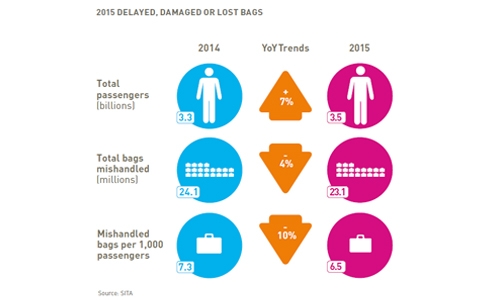Air passenger bag handling on track
Manama : Airline passengers lost the least number of bags in 2015, as a ratio to total number of passengers, according to the latest report from SITA, a global provider of air transport communications.
The report calculates that the rate of mishandled bags was 6.5 bags per thousand passengers in 2015, down 10.5pc from the previous year, less than half the rate in 2003 and the lowest ever recorded.
Last year more than 3.5 billion passengers travelled and to handle the baggage associated with this huge number of passengers, the International Air Transport Association (IATA) is encouraging airlines to track each bag throughout its entire journey. IATA Resolution 753, to be implemented by airlines by June 2018, will mean that bags will be tracked at every point of the journey.
Francesco Violante, CEO, SITA, said, “Over the next three years, bag tracking will be in the spotlight as airlines ready themselves to implement IATA’s Resolution 753. This increase in visibility will provide more control and drive further improvements in bag handling.
“It also means that passengers will be able track their bag, just like a parcel, which will reduce anxiety and allow them to take fast action if flights are disrupted and their bags are delayed.”
While transfer bags continue to comprise the majority of all delayed bags, the percentage has fallen to 45pc, down from 49pc in 2014. In real terms 8.43 million bags were delayed during transfer in 2015.
Loading/offloading errors improved slightly, accounting for 4pc of delayed bags (6pc in 2014). However, ticketing errors, bag switches, security issues and other problems accounted for 19pc of delayed bags, up from 15pc in 2014. Keeping pretty much in line with performance in 2014, failure to load accounted for 16pc of delayed bags; airport/customer/weather/space-weight restrictions represented 8pc; tagging errors and failures to load 4pc; and arrival station mishandling 4pc, according to the report.
The 2015 bag mishandling cost of US$0.65 per passenger represents 0.35pc of the airline industry’s US$185 operating cost per passenger. Nevertheless, with the industry working on an average operating profit of US$15.5 per passenger, it is clear that the ability to curb its expenditure on mishandled bags will have a positive impact on profits, the report noted.
If the mishandled bags were not reduced in numbers and the 2014 trend had continued, the industry would have lost US$6.2bn, as the number of lost bags would have doubled to 62.8m.
Thus, the report notes, over the eight-year period from 2008 to 2015, the investments to improve baggage-handling performance have saved the air transport industry US$22bn.
Since 2003, the mishandling rate has halved from 13.2 bags per 1,000 passengers to 6.5 in 2015, but the passenger numbers have almost doubled.
Efforts to improve transfer bag mishandling, when passengers and their luggage are moving from one aircraft to another or from one carrier to another, are paying off, despite the potential complexity of such transfers for passengers.
“Baggage capabilities remain quite different across the industry. Given the growing pressure on capacity, the industry can count itself very fortunate to have a reduced mishandling figure for 2015. This is due to the hard work of the many thousands of people involved in making sure that baggage is processed quickly, efficiently and accurately each day,” Andrew Price, Head of Airport Operations Management, International Air Transport Association said.
Related Posts

